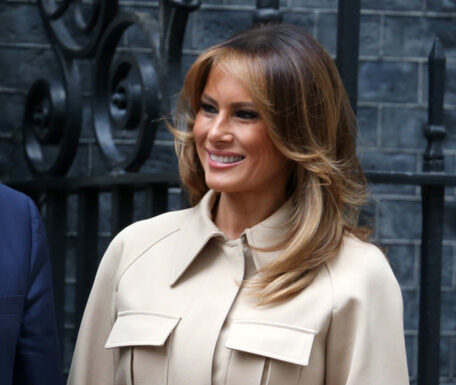First Lady Melania Trump made a rare public appearance at the White House on Thursday, September 4, warning attendees that artificial intelligence and robotics have evolved beyond science fiction into present-day reality. During a meeting of the White House AI education task force, Trump delivered pointed remarks about the need for careful oversight of emerging technologies.
“The robots are here,” Trump stated, emphasizing that society must treat AI with watchful guidance similar to raising children. The First Lady described the current period as a primitive stage requiring responsible stewardship of artificial intelligence development.
The 55-year-old former fashion model, born Melanija Knavs in Slovenia, has maintained a notably low public profile throughout her husband’s second term. Her last public appearance occurred in July at New Jersey’s MetLife Stadium for the FIFA Club World Cup final. The extended absence prompted criticism and questions about her whereabouts from political observers.
Trump’s remarks at the AI task force meeting highlighted specific examples of technological advancement currently impacting daily life. She noted that autonomous vehicles navigate city streets, robotic systems perform surgical procedures, and drone technology reshapes military operations. The First Lady emphasized that these innovations represent significant shifts driven by artificial intelligence development.
The White House event, dubbed the Presidential AI Challenge, brought together cabinet members, administration officials, and representatives from major technology companies including IBM and Google. Unlike traditional First Lady events centered around children, this gathering focused on business and legislative aspects of technology policy.
Several corporations announced significant commitments during the event. IBM pledged to train two million American workers in AI technologies, while Code.org committed to reaching 25 million students with AI-focused curricula. Microsoft and Amazon also unveiled new programs aimed at integrating AI education into K-12 schools nationwide.
Trump’s involvement in technology policy builds on her previous legislative work. In May, she became the first First Lady to co-sign legislation when she joined President Trump in signing the Take It Down Act. The bill criminalized posting intimate images, whether real or AI-generated, without individual consent and received rare bipartisan support in Congress.
Einav Rabinovitch-Fox, a Case Western Reserve University professor specializing in First Lady history, noted that Trump’s approach differs from traditional feminine-focused initiatives. Rather than emphasizing motherly or nurturing aspects, Trump addresses technology issues from business and legislative perspectives. The Take It Down Act specifically targeted platforms hosting inappropriate content, requiring removal within 48 hours or facing penalties.
Anita McBride, director of American University’s First Ladies Initiative and former chief of staff to Laura Bush, observed significant changes in Trump’s second-term approach. Organizations previously reluctant to collaborate with the First Lady now demonstrate willingness to participate in her initiatives. McBride attributed this shift to Trump’s focus on technological and business aspects of child protection.
The First Lady’s selective public engagement strategy extends beyond domestic policy. In August, she wrote to Russian President Vladimir Putin emphasizing the importance of protecting children and future generations worldwide. Her letter prompted responses from Ukrainian First Lady Olena Zelenska and Turkish First Lady Emine Erdogan, demonstrating international attention to her initiatives.
McBride suggested that Trump’s background in Slovenia, a country formerly under Soviet influence, provides unique perspective on international issues. This experience allows her to engage selectively on topics aligned with her specific interests and expertise areas.
Critics of the Presidential AI Challenge noted the absence of discussion regarding potential risks to children from AI technology, particularly concerning mental health and online safety. Watchdog groups accused the administration of prioritizing technology company interests over comprehensive regulatory discussions about artificial intelligence accountability.
Trump’s current focus on AI education represents continuation of her “Be Best” initiative from the President’s first term, which addressed child well-being, cyberbullying prevention, and opioid abuse combat. However, her second-term approach emphasizes legislative action and corporate partnerships rather than traditional First Lady programming.
The First Lady reportedly divides her time between the White House, New York, and Florida, maintaining a reduced public schedule compared to previous First Ladies. McBride indicated that Trump will likely continue her selective engagement strategy throughout the remaining three years of the administration, focusing on quality over quantity in her public appearances.








